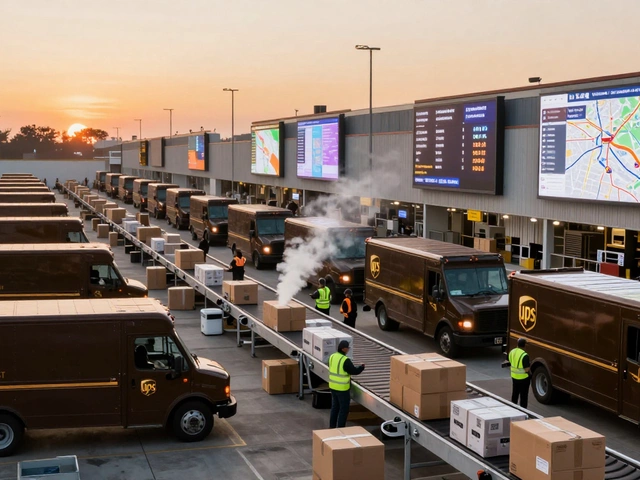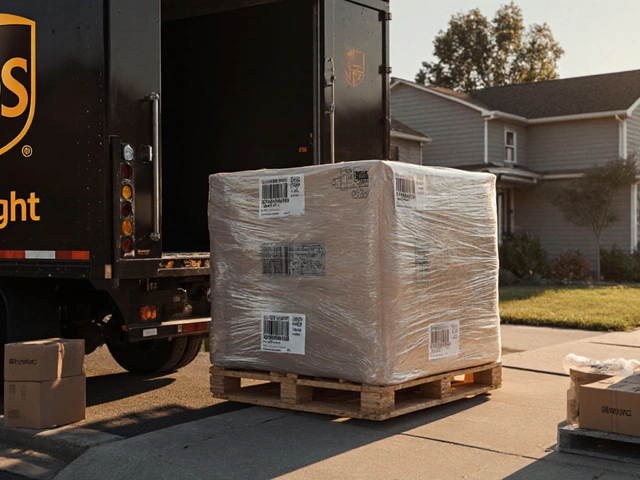The idea of launching a courier business in 2025 might seem promising given the surge in online shopping and e-commerce. However, one must ponder the various factors that can influence success in this field. A multitude of market trends, competition levels, and technological advancements have reshaped the delivery landscape.
Although lucrative opportunities exist, diving into this industry requires more than just optimism. It's about understanding the intricacies, from the initial capital needed to the evolving customer demands, and anticipating potential obstacles along the way. Let's delve into the key aspects to consider before embarking on this entrepreneurial journey.
- Current Market Trends
- Investment and Costs
- Technological Influence
- Customer Expectations
- Tips for Success
Current Market Trends
The delivery industry is experiencing a significant transformation, driven by the unceasing growth of e-commerce and consumer expectations for fast, reliable service. The landscape has been largely shaped by the digital revolution, and courier businesses are no exception, adapting swiftly to meet new demands. The proliferation of smartphones and mobile apps has empowered consumers to track, modify, and receive notifications for their orders in real-time, increasing transparency and trust in the service. This is why staying ahead with the latest technological innovations is paramount for success in the courier business.
The rise of the gig economy has also left its mark, with many courier services adopting flexible workforce models to handle fluctuating demand. Driven by platforms like Uber and DoorDash, traditional job structures are being replaced by flexible arrangements, providing both scalability for the business and autonomy for the drivers. In this evolving landscape, businesses need to ensure they offer competitive and fair compensation to attract reliable workers while still maintaining operational efficiency.
According to a report from the Global Courier and Delivery Services Market, the industry is projected to grow by 7.5% annually, reaching a market value of $485 billion by 2030.
Moreover, environmental consciousness is now an integral part of the logistics conversation. Eco-friendly delivery options are swiftly becoming a deciding factor for consumers, with many companies exploring electric vehicles, bicycle couriers, and carbon-offset shipping methods. Adapting to these trends not only enhances a brand’s image but also aligns the company’s operations with global sustainability goals.
The landscape of competition in the delivery sector is another major trend influencing business strategies. Tech giants like Amazon and Alibaba have set high standards with their logistics prowess, setting benchmarks that smaller enterprises struggle to meet. This necessitates a focus on niche markets or specialized services to carve a distinct identity. Offering unique value propositions, such as hyper-local services or personalized customer experiences, could prove essential for capturing market share.
| Year | Growth Rate |
|---|---|
| 2023 | 6.8% |
| 2024 | 7.0% |
| 2025 | 7.2% |
For anyone contemplating the launch of a courier business, these trends underline the importance of agility and innovation. Observing, interpreting, and responding to market signals in real-time equips businesses with critical foresight, steering strategies that cater to both immediate needs and long-term aspirations. By embracing change, staying informed, and aligning with customer preferences, aspiring entrepreneurs can navigate this dynamic sector with confidence and purpose.
Investment and Costs
Embarking on a venture into the courier industry requires meticulous financial planning due to the myriad of expenses one might incur. One of the first steps is understanding the scope and scale of the courier service envisioned, which directly influences the initial capital outlay. Small-scale operations might start with just a few vehicles and a handful of employees, whereas a large scale, professional setup could involve a fleet of delivery vans, sophisticated software for tracking, and a workforce to manage logistic operations. It's not uncommon for a small courier company to require anywhere from $10,000 to $50,000 as an initial investment, whereas larger ventures might demand upwards of $200,000.
Capital expenditure extends beyond vehicles. Essentials like office space, packaging supplies, and licenses must also be accounted for. Many states mandate specific permits for operating a delivery service, and these often come with their own fees. Technology acquisition is another critical area—we're talking about GPS systems, package scanners, and routing software, which streamline operations and enhance efficiency. These tools can vary substantially in price, depending on features, with some sophisticated systems costing thousands. According to a report by Statista, the global logistics technology market is projected to reach $12 billion by 2027, driven by the need for technological integration in logistics.
The future of courier services hinges not only on efficient delivery but also on how well one integrates cutting-edge technology into their processes. - Jane Doe, Logistics Expert
Then there's the running costs to consider. Fuel, vehicle maintenance, employee salaries, and insurance premiums represent ongoing expenses that can become substantial. Gas prices fluctuate, and maintenance costs can become burdensome if vehicles aren't properly cared for. It's crucial to establish a budget that encompasses all these factors to avoid unpleasant surprises down the line. Additionally, hiring skilled personnel demands competitive pay to attract and retain the best talent, especially in a market where the competition for drivers can be fierce.
For budding entrepreneurs, savvy financial management and strategic planning are indispensable. It might be wise to consult with a financial advisor to establish a robust business plan. This planning should project revenue growth and under consideration of unexpected challenges that could arise. Some suggest setting aside an emergency fund, equating to at least six months of expenses, providing a cushion against unforeseen circumstances. A comprehensive understanding of these elements not only helps prepare for the financial journey but ensures long-term sustainability and profitability in a rapidly evolving industry.

Technological Influence
The courier business landscape in 2025 is unrecognizable from a few years ago, thanks to the rapid expansion of technology. Innovations such as automated dispatching systems, real-time tracking, and advanced route optimization software have streamlined operations. These solutions not only improve efficiency but also enhance customer satisfaction, which has become absolutely central to staying competitive. Using GPS and IoT devices, companies can provide live updates on package status, while AI algorithms predict delays and suggest alternate routes for delivery vehicles.
Another significant leap in logistics technology is the use of drones and autonomous vehicles for delivery. Though still in experimental phases in many regions, their potential is undeniable. Eliminating human drivers from the equation reduces labor costs significantly and allows delivery services to operate around the clock. It's crucial, however, to navigate through regulatory frameworks and public skepticism effectively. A report by the McKinsey Global Institute states, "Autonomous vehicles could reduce logistics costs by an estimated 40%, making them a gamechanger in the courier sector." This quote highlights the impact of technological advances on delivery services.
Blockchain technology is also becoming a key player, offering secure and transparent transactions. With blockchain, too, the integrity of data is assured and any fraud can be minimized. Many businesses are already exploring blockchain for its potential to build trust in courier services. For instance, by recording every transaction and interaction across the supply chain, businesses can reassure clients regarding the safety and timeliness of their packages. Such investments in technology make good business sense, fostering transparency and efficiency, two valuable commodities in the courier industry.
A potential gamechanger for the courier business is Big Data analytics. Companies gather massive amounts of data, from customer feedback to delivery performance metrics. This data becomes indispensable when analyzed effectively, providing insights into consumer behavior and operational bottlenecks. Utilizing predictive analytics, courier companies can enhance decision-making processes and tailor customized services to individual needs. The use of Big Data not only forecasts demand but also helps in resource allocation and in devising marketing strategies that drive growth.
There's no doubt that technology is the backbone of a successful courier business today. Investing in the right technology can also directly affect the bottom line by reducing costs, increasing productivity, and attracting more clients due to enhanced service quality. While the initial investment may seem substantial, the long-term benefits far outweigh the costs. As more technology solutions become available, it will be crucial for anyone starting a courier business to stay updated and flexible, ready to adapt as new trends emerge. Those who embrace this technological evolution could find monumental success.
Customer Expectations
In the realm of the courier industry, understanding what consumers demand is crucial for the sustained growth of any delivery venture. As we tread through 2025, customer expectations have evolved significantly, fundamentally influenced by rapid advances in technology and changing lifestyle needs. Consumers now prioritize immediacy and reliability as the baseline from which they measure service effectiveness. A recent survey by the National Retail Federation found that nearly 73% of online shoppers regard fast delivery as a top driver of their purchasing decisions, indicating how crucial speed has become.
Additionally, customization appears to hold a significant spotlight. More recipients seek tailored delivery experiences—whether it’s choosing precise delivery windows or having packages dropped off at predetermined safe spots. The days of call centers have long diminished, as users expect elevating customer support through interactive apps and real-time tracking systems. There's an evident demand for transparency whereby every touchpoint acts as an opportunity to reinforce trust. When juggling between couriers, it's not just the efficiency of package delivery that matters, but also the assurance of having reliable communication channels open.
When one takes a deeper dive, sustainability has joined the expectations list, bleeding into the environmental considerations that more users seem to account for today. Around 67% of consumers say they are more inclined to align with brands practicing eco-friendly policies. There’s rising pressure on logistics companies to minimize carbon footprints by adopting green packaging processes and fuel-efficient transport options.
Citing a point from Green Business Network: "Customers are no longer satisfied with just good service; they expect businesses to demonstrate conscious responsibility in their operations."Prosperity in the courier market increasingly means showcasing as much concern for earth-friendly practices as for the recipient's satisfaction.
Moreover, with globalization bringing the globe closer than ever, multilingual support is becoming a necessity in diverse regions. A globalized purchaser, possibly a non-native speaker, should be able to navigate services seamlessly without being lost in translation—both literally and figuratively. This provides immense room for competitive growth for those who can genuinely accommodate different lingual needs. Consequently, meeting customer expectations in the delivery sector revolves around marrying technology smoothly with convenience, transparency, adaptability, and an ethos of sustainability. While the stakes are high, nailing these aspects invites enduring customer loyalty and strengthens the foundation upon which a budding courier can grow robustly.

Tips for Success
Venturing into the world of courier services can be a thrilling, albeit challenging, journey. The landscape has evolved with the rise of technology and changing customer preferences. To carve a niche in this competitive market, entrepreneurs must focus on a blend of efficiency, reliability, and adaptability. Having a well-thought-out strategy that enhances operational processes is crucial to realize sustained growth. To begin, invest in understanding your target market. Knowing the demographics, preferences, and expectations of your potential customers can help tailor your services effectively. Delivery isn't just about transporting packages; it's about providing a seamless and satisfying experience. Customers value timeliness as much as package safety, so honing your logistics and operations is vital.
Technology plays an indisputable role in the success of a business today. Implementing top-notch IT solutions such as tracking systems can significantly improve customer satisfaction. Real-time tracking not only boosts your operation's transparency but also enhances trust with your clients. Invest in software that allows route optimization, as it can lead to reduced delivery times and fuel costs, thus boosting profitability. Besides, the importance of establishing a solid online presence cannot be overstated. With the growing reliance on digital platforms, a user-friendly website, and an app can attract a plethora of customers seeking convenience and ease.
Building a strong team is another pillar of success. Hiring skilled and enthusiastic personnel can drive customer satisfaction. Continuous training ensures that your team is up-to-date with the latest industry trends and service expectations. Dedication to outstanding customer service fosters loyalty and word-of-mouth referrals, an often overlooked yet powerful marketing tool. This loyalty can become a fortress, protecting your market position against competitors. Remember, adaptability is crucial; this industry is dynamic and ever-changing. Adjustments in market strategies should be swift and informed by consumer behavior and technological advancements.
"Success usually comes to those who are too busy to be looking for it." – Henry David ThoreauWhile Henry Thoreau's words resonate through time, they emphasize the need for diligence and perseverance in building a successful courier venture. Keeping an eye on trends and always seeking innovative solutions are traits of resilient entrepreneurs.
Considering the extensive responsibilities, aspiring courier entrepreneurs should focus on insurance and compliance. Insuring your fleet against potential damages and losses cultivates peace of mind among both operators and customers. Stay informed about regulations, as they can vary widely depending on your geographic location, affecting pricing, services offered, and operational procedures. Ignoring these could lead to unexpected complications, both legally and financially.
It’s also essential to engage in networking. Building alliances with other logistics firms, participating in industry forums, and attending relevant trade shows can provide valuable insights and open doors to partnerships. Continued learning through such interactions can offer innovative solutions and alternative perspectives that you may not have considered. These alliances not only expand your knowledge but also strengthen your foothole as a reliable player in the courier industry.





